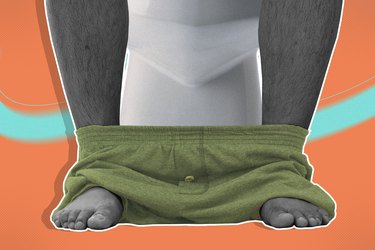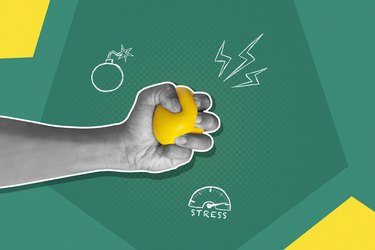
There's no mistaking constipation pain. That crampy, heavy feeling that comes when your pipes are plugged up can be seriously unpleasant. But abdominal pain isn't always the only side effect of constipation.
Experts officially define constipation as having fewer than three bowel movements per week, per the National Institute of Diabetes and Digestive and Kidney Diseases. The stuff that does come out tends to be hard, dry and uncomfortable to pass, and leaves you with that icky feeling like you're not finished pooping.
Video of the Day
Video of the Day
Stomach discomfort is definitely the most common side effect of constipation, says Satish Rao, MD, PhD, gastroenterologist and professor of medicine at Augusta University Medical College of Georgia. But it's far from the only problem you can run into.
Here's a head-to-toe look at nine ways a bathroom blockage can affect your body, plus when to bring up constipation issues with your doctor.
Tip
Constipation is often the result of eating too little fiber, not drinking enough water or being too sedentary, per the Mayo Clinic. In some cases the culprit may be medications, hormonal changes, rectal blockages or problems with nerves around the rectum.
1. You Might Get Dizzy or Lightheaded
Not everyone feels dizzy when they're constipated. But it's possible to get hit with a lightheaded feeling when you're trying hard to go and nothing is coming out.
"It's usually caused by excessive straining and a vasovagal reflex response," explains Dr. Rao.
Straining activates the vagus nerve, triggering a slowed heart rate and drop in blood pressure. This drop, in turn, can temporarily reduce blood flow to the brain and make you feel dizzy, Dr. Rao says.
2. You Could Break Into a Sweat
Straining to poop can be hard work. On top of that, all of that pushing is, again, activating the vagus nerve, explains Scott Lippe, MD, a gastroenterologist at New Bridge Medical Center in Paramus, New Jersey.
That's why, in addition to feeling dizzy or lightheaded, you might also get a case of the poop sweats.
3. You Might Not Have Much Energy
Another complication of constipation is feeling sluggish or lethargic. The combination of abdominal discomfort and bloating can definitely sap your energy, say Drs. Lippe and Rao.
"This is commonly reported by many of my patients, but unfortunately it is not a well-documented symptom in medical literature," Dr. Rao says.
4. Your Appetite May Go Missing
Not feeling up for eating at the moment? It's typical for hunger to take a back seat when you're constipated.
"When the colon and the rectum are full of stool, the rectum sends reflex messages to the stomach and the brain to slow down stomach emptying, giving rise to prolonged fullness after meals," Dr. Rao explains.
In other words? When food is still working its way through your GI tract, your belly may not want any more.
5. You May Feel Nauseous
In some cases, constipation can cause queasiness. It has to do with the same factors that cause diminished appetite, Dr. Rao says.
So if you're not actually hungry and you try to eat anyway, you might end up feeling nauseous. For this reason, one of the side effects of chronic constipation can be vomiting, according to the University of Virginia School of Medicine.
6. You'll Feel Cramped and Bloated
Sharp churning and a gassy, puffed-out belly are the hallmark signs of constipation pain. And for good reason: "The cramping is from the body squeezing to try to get the stool out," explains Dr. Lippe.
At the same time, the hard, dry stool acts like a plug to trap gas in your colon, which can trigger bloating and make your pants feel too tight.
These symptoms might be particularly noticeable after taking laxatives to try to get things moving, Dr. Rao says.
7. You Could Have Lower Back Pain
You might not just feel the crampy pain in your front. It's not unusual for this discomfort to radiate toward your lower back, too, Dr. Lippe says.
8. Over Time, You Might Experience Bladder Leakage
Chronic constipation can raise the risk for urinary incontinence, according to the Cleveland Clinic.
Repeatedly straining to poop or trying to push for too long can potentially weaken your pelvic floor muscles, which can lead to urine leakage.
9. You Could Get Hemorrhoids
Hemorrhoids, or swollen veins in the lower rectum, are another common side effect of chronic constipation, Dr. Rao says.
The problem also comes from repeated straining, which can put excessive pressure on the veins around the anus. Ouch.
In more extreme cases, the long-term effects of constipation can include anal fissures (torn skin around the anus), fecal impaction (stools that can't be expelled from the body) and rectal prolapse (when part of the rectum protrudes from the anus), per the Mayo Clinic.
When to See a Doctor About Constipation
Having trouble going once in a while isn't usually a big deal, especially if you're able to get things moving with home remedies for constipation, such as upping your fiber and water intake or taking an over-the-counter laxative.
But you should contact your doctor if at-home measures aren't enough to clear the pipes, or if you've been constipated more than twice in the last three months, Dr. Rao says.
Constipation is an emergency when it's accompanied by alarming symptoms like weight loss, blood in your stool, anemia, persistent bloating, nighttime pain or a mass in your stomach, or if you have a family history of colon cancer, Dr. Rao says.
If you have any of the above symptoms, seek medical help ASAP. Your doctor may conduct diagnostic testing to determine if there's an underlying problem.
Is this an emergency? If you are experiencing serious medical symptoms, please see the National Library of Medicine’s list of signs you need emergency medical attention or call 911.



